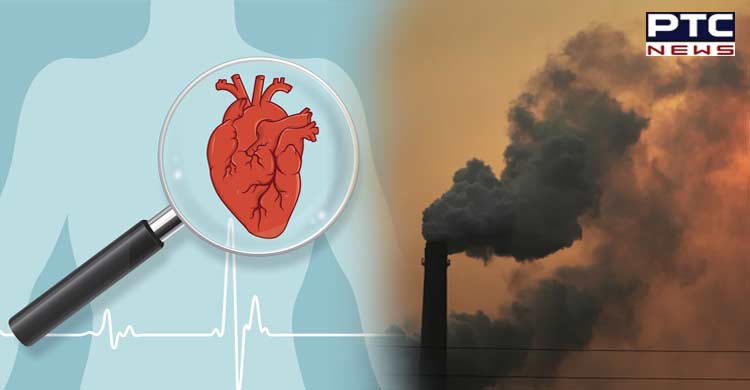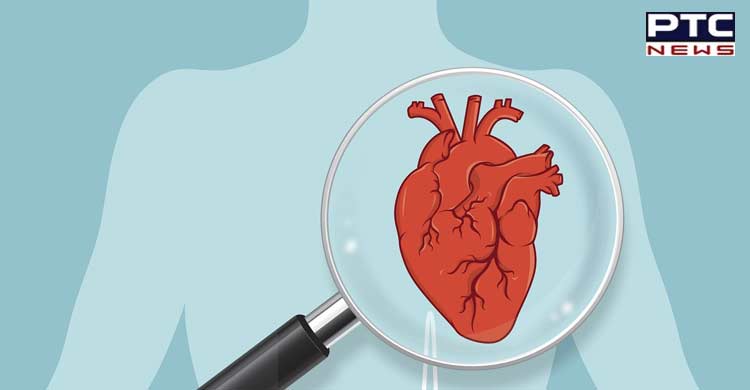

Air pollution linked to fatal heart rhythm disorder
Brussels [Belgium], May 21: According to new research by the scientific congress of the European Society of Cardiology, life-threatening arrhythmias are more common on days with highly polluted air (ESC).
 The study was carried out on patients who had an implantable cardioverter-defibrillator (ICD), allowing the researchers to track the occurrence of arrhythmias and the delivery of life-saving therapy.
The study was carried out on patients who had an implantable cardioverter-defibrillator (ICD), allowing the researchers to track the occurrence of arrhythmias and the delivery of life-saving therapy.
 Also Read: Stress, anxiety, depression during pregnancy may hinder offspring's cognitive development
Study suggests that people at high risk of ventricular arrhythmias, such as those with an ICD, should check daily pollution levels.
"When particular matter (PM) 2.5 and PM 10 concentrations are high (above 35 mg/m3 and 50 mg/m3, respectively), it would be sensible to stay indoors as much as possible and wear an N95 mask outside, particularly in areas of heavy traffic. An air purifier can be used at home."
According to the World Health Organization, outdoor air pollution kills an estimated 4.2 million people every year. Nearly one in five cardiovascular disease deaths are due to dirty air, which was ranked the fourth-highest risk factor for mortality after high blood pressure, tobacco use and poor diet.
Also Read: Stress, anxiety, depression during pregnancy may hinder offspring's cognitive development
Study suggests that people at high risk of ventricular arrhythmias, such as those with an ICD, should check daily pollution levels.
"When particular matter (PM) 2.5 and PM 10 concentrations are high (above 35 mg/m3 and 50 mg/m3, respectively), it would be sensible to stay indoors as much as possible and wear an N95 mask outside, particularly in areas of heavy traffic. An air purifier can be used at home."
According to the World Health Organization, outdoor air pollution kills an estimated 4.2 million people every year. Nearly one in five cardiovascular disease deaths are due to dirty air, which was ranked the fourth-highest risk factor for mortality after high blood pressure, tobacco use and poor diet.
 "We had observed that emergency room visits for arrhythmias in patients with ICDs tended to cluster on days with particularly high air pollution," noted Dr Zanni. "We, therefore, decided to compare the concentration of air pollutants on days when patients had an arrhythmia versus pollution levels on days without an arrhythmia."
Data on ventricular arrhythmias (ventricular tachycardia and ventricular fibrillation) were collected remotely from the ICD until study completion at the end of 2017. The researchers also recorded the therapy delivered by the device. This included anti-tachycardia pacing for ventricular tachycardia (fast heartbeat), which delivers electrical impulses to the heart muscle to restore a normal heart rate and rhythm. The second therapy was an electric shock to reset the heartbeat during ventricular fibrillation.
A total of 440 ventricular arrhythmias were recorded during the study period, of which 322 were treated with anti-tachycardia pacing and 118 were treated with a shock. The researchers found a significant association between PM2.5 levels and ventricular arrhythmias treated with shocks, corresponding to a 1.5 per cent increased risk for each 1 mg/m3 rise in PM2.5.
"We had observed that emergency room visits for arrhythmias in patients with ICDs tended to cluster on days with particularly high air pollution," noted Dr Zanni. "We, therefore, decided to compare the concentration of air pollutants on days when patients had an arrhythmia versus pollution levels on days without an arrhythmia."
Data on ventricular arrhythmias (ventricular tachycardia and ventricular fibrillation) were collected remotely from the ICD until study completion at the end of 2017. The researchers also recorded the therapy delivered by the device. This included anti-tachycardia pacing for ventricular tachycardia (fast heartbeat), which delivers electrical impulses to the heart muscle to restore a normal heart rate and rhythm. The second therapy was an electric shock to reset the heartbeat during ventricular fibrillation.
A total of 440 ventricular arrhythmias were recorded during the study period, of which 322 were treated with anti-tachycardia pacing and 118 were treated with a shock. The researchers found a significant association between PM2.5 levels and ventricular arrhythmias treated with shocks, corresponding to a 1.5 per cent increased risk for each 1 mg/m3 rise in PM2.5.
 They also found that when PM2.5 concentrations were elevated by 1 mg/m3 for an entire week, compared to average levels, there was a 2.4 per cent higher likelihood of ventricular arrhythmias regardless of the temperature. When PM10 was 1 mg/m3 above average for a week there was a 2.1 per cent raised risk of arrhythmias.
Also Read: Research shows how brain changes during treatment of depression
Dr Zanni said: "Particulate matter may cause acute inflammation of the heart muscle which could act as a trigger for cardiac arrhythmias. As these toxic particles are emitted from power plants, industries and cars, green projects are needed to protect the health, on top of the actions individuals can take to protect themselves."
-PTC News
They also found that when PM2.5 concentrations were elevated by 1 mg/m3 for an entire week, compared to average levels, there was a 2.4 per cent higher likelihood of ventricular arrhythmias regardless of the temperature. When PM10 was 1 mg/m3 above average for a week there was a 2.1 per cent raised risk of arrhythmias.
Also Read: Research shows how brain changes during treatment of depression
Dr Zanni said: "Particulate matter may cause acute inflammation of the heart muscle which could act as a trigger for cardiac arrhythmias. As these toxic particles are emitted from power plants, industries and cars, green projects are needed to protect the health, on top of the actions individuals can take to protect themselves."
-PTC News
